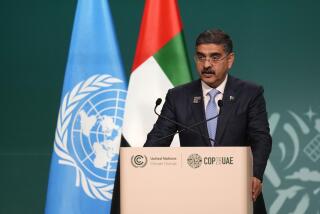A suicide car bomb tore through a bustling ...
ISLAMABAD, PAKISTAN — A suicide car bomb tore through a bustling market in the northwestern city of Peshawar on Friday, killing at least 49 people in what appeared to be the Pakistani Taliban’s latest broadside against a government that says it is preparing a significant military offensive against the militants.
The explosion, which also injured more than 100 people, occurred at the Khyber Bazaar in the capital of Pakistan’s violence-racked North-West Frontier Province.
Though there was no immediate claim of responsibility for the attack, Pakistani officials said they believed it was the work of the Pakistani Taliban. The militant group has vowed to ratchet up suicide attacks in response to the Pakistani government’s preparations for an all-out offensive in South Waziristan, a primary base of operations for the Taliban and Al Qaeda.
The attack was a deadly reminder of the risks as President Obama considers shifting his regional strategy to focus on Al Qaeda rather than the Afghan Taliban as the biggest threat to American security. The administration wants to make a distinction between the Taliban, based in Afghanistan and Pakistan and regarded as fundamentalist militants driven by a local agenda, and Al Qaeda’s global terrorist network.
However, such a shift would have to take into account the role that the Pakistani Taliban plays in providing sanctuary to Al Qaeda in Pakistan’s largely lawless tribal areas. When Al Qaeda militants fled eastern Afghanistan during the U.S.-led invasion in 2001, they entrenched themselves in the Waziristan region of northwestern Pakistan with the help of Pakistani Taliban fighters.
Speaking in Islamabad, Pakistan’s capital, Interior Minister Rehman Malik said the blast in Peshawar is “a reminder that the Taliban need to be dealt with severely.
“All roads lead to Waziristan,” Malik said. “Any operation in Waziristan shouldn’t be delayed anymore. We think we should launch a full-fledged offensive very soon.”
The attacker Friday hit a crowded market. The assailant drove his car through the bazaar and set off about 110 pounds of explosives, said Shafqat Malik, a police bomb squad specialist.
The blast ripped through market stalls and nearby buildings, scorching and flipping over a passing minibus filled with people. Many of the dead were found in the charred vehicle frame.
Pools of blood dotted the area, littered with pieces from destroyed vehicles.
“I was buying something at a shop when the blast hit,” said Rahim Gul, 60, who suffered head injuries. “My vision got completely blurry and I lost my senses.”
The attack at Khyber Bazaar comes nearly two weeks after a suicide car bombing near a state-owned bank in Peshawar killed 12 people and wounded 91.
That same day, a suicide attacker in a pickup truck rammed a barricade outside a police station in the town of Bannu, about 100 miles southwest of Peshawar. That explosion killed 15 people and injured 60.
On Monday, a suicide bomber disguised in a paramilitary police uniform walked into the lobby of the United Nations’ heavily fortified World Food Program office in Islamabad. The blast killed five agency workers.
Malik said police have arrested a man who helped facilitate that bombing and have identified other suspects. He gave no further details.
Washington has urged Pakistan to forge ahead with a ground offensive in South Waziristan aimed at wiping out Taliban strongholds there as well as Al Qaeda hide-outs.
The Pakistani military this year mounted a successful ground offensive to oust Taliban militants from the volatile Swat Valley. A successful campaign in Waziristan as well could cripple the Islamic militant group and prevent Al Qaeda from using the area as sanctuary.
But three military offensives against militants there since 2001 have failed, and most experts say an offensive would be far more difficult than was the effort to retake Swat in the spring.
The mountainous terrain in Waziristan is even more challenging, and the region’s Taliban fighters are far more battle-hardened and better trained than their Swat counterparts.
A fierce contingent of Uzbek militants is also expected to fight alongside the Taliban in Waziristan.
Over the last few months, Pakistani fighter jets and helicopter gunships have pounded suspected Taliban camps and weapons caches. Experts say as many as 20,000 Pakistani troops have amassed in and around South Waziristan, and the military has tried to block militants’ supply and escape routes.
For more than a week, Pakistani military and government leaders have been openly declaring that an offensive in Waziristan is imminent, but they have yet to proceed. In the meantime, the people of Peshawar, a city of nearly 3 million east of the restive tribal areas along the Afghan border, worry that they are bearing the brunt of retaliatory strikes from the Taliban while the military delays its move.
In addition to the suicide attacks, Peshawar has been hit with frequent rocket attacks and ambushes of police convoys and checkpoints. Before the blast Friday, militants set fire to two tankers near Peshawar that were transporting fuel to North Atlantic Treaty Organization-led troops in Afghanistan.
“There is definitely a sense of fear here because these militants continue attacking,” said defense analyst Mehmood Shah, a former Pakistani general who lives in Peshawar.
“And an attack like this one today in a public place -- it puts more fear into people.”
--
Special correspondent Zulfiqar Ali in Peshawar contributed to this report.
More to Read
Sign up for Essential California
The most important California stories and recommendations in your inbox every morning.
You may occasionally receive promotional content from the Los Angeles Times.










